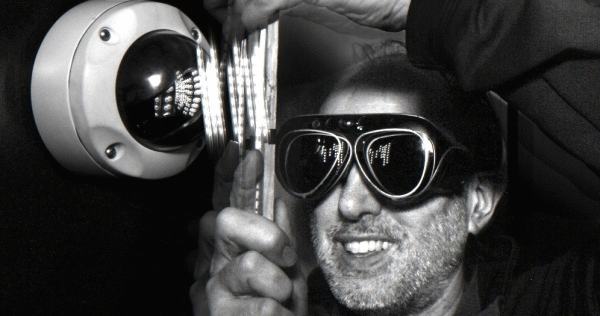
May 12, 2015
He has been called “the father of wearable computing,” “the world’s first cyborg” and “the father of augmented reality.” But when he started building some of the first wearable computers and digital vision systems almost 40 years ago, some called him crazy.
But history has left no doubt that Steve Mann, professor in The Edward S. Rogers Sr. Department of Electrical & Computer Engineering, is a visionary. He was recognized Friday with the Digital Pioneer Award at Digifest 2015 for his trailblazing work as a lifelong inventor, artist, teacher, researcher and thinker at the ever-shifting intersection of technology and philosophy.
“The Digital Pioneer award is intended to celebrate a person whose works blend creativity and emerging technologies, but more importantly, a person whose work continues to speak to the conversations of our time,” said Luigi Ferrara, dean of the Centre for Arts & Design at George Brown College and founder of Digifest, Canada’s premier digital festival. “This award recognizes Mann’s accomplishments, as well as his journey…Toronto has become known as one of the hotbeds of wearable technology, with Steve Mann as its pioneer.”
“I’m very honoured to be recognized here,” said Mann in his acceptance speech. He expanded on concepts raised in his earlier keynote address, touching not only on the new technologies that have emerged from his lab over several decades, but on their meaning and the broader consequences of technology on people and society.
“We have smart floors, smart sinks, smart watches, smart sensors, but what about smart people?” asked Mann. “I think as humans, we’re advancing into a new type of being, a more advanced kind of being.”
Mann shared his love for teaching, and said the most rewarding experience for him has been attracting “some really bright students to come and riff with me.” He advocated for curiosity, well-rounded thinkers, and the value of tinkering with old equipment to figure out how it works—old equipment has integrity because it’s well made, and the circuit diagram is usually clearly displayed on the back panel, he said.
“I describe myself as a cyborg Luddite, because I sort of hate new technology,” Mann told the audience. “They used to say ‘Don’t trust anyone over 30—well I don’t trust anything under 30!”
As someone who began inventing today’s technology more than 40 years before it entered the mainstream, what does Mann see as the critical challenges of our time?
“The most fundamental human thing that’s necessary is integrity,” said Mann. “Really what we need in all this digital technology is integrity—that’s what I would like to see happen.”
More information:
Marit Mitchell
Senior Communications Officer
The Edward S. Rogers Sr. Department of Electrical & Computer Engineering
416-978-7997; marit.mitchell@utoronto.ca